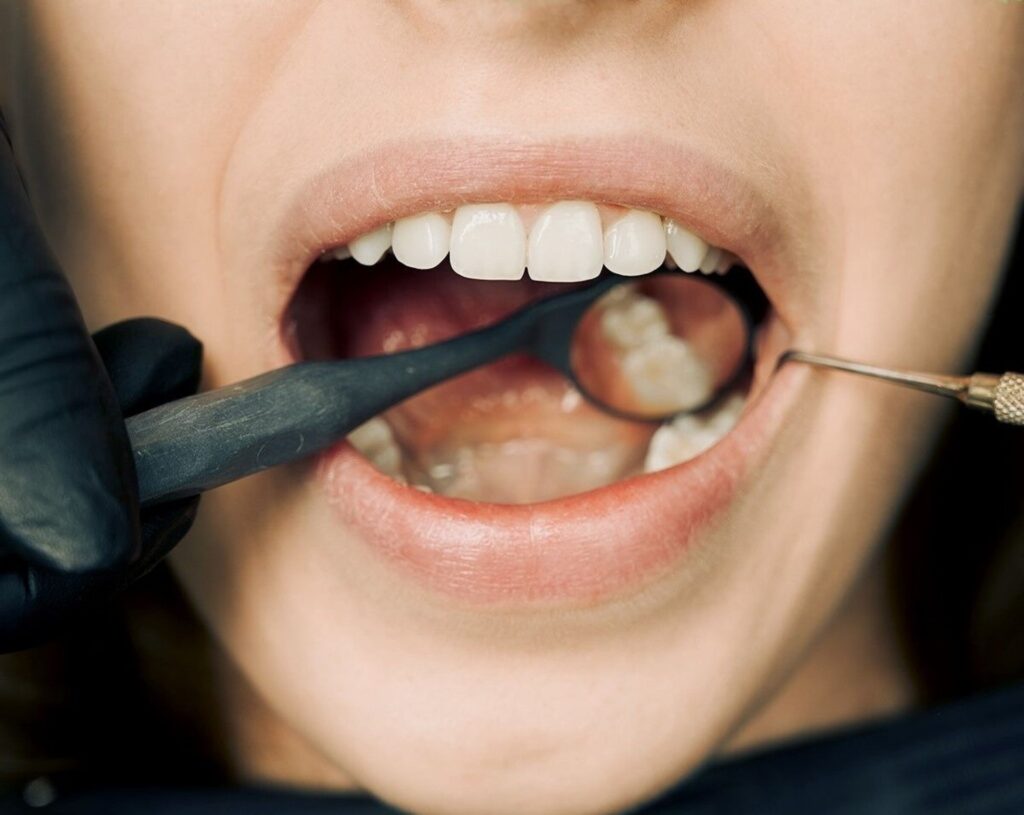Pregnancy is considered an exciting time for women. Hormonal changes during pregnancy can cause various health problems in their oral health. Therefore, women should take more care of oral and dental health during pregnancy.
- During pregnancy, sex hormones such as progesterone and estrogen are released in a woman’s body. When these hormones are modified together, the blood flow to the gums increases. Therefore, if a woman does not take care of her oral and dental hygiene during pregnancy, the pieces of food and plaque consumed by her will weaken the gums even more. This causes the gums to become swollen, red and soft.
In women, gingivitis (swelling of the gums) is seen only at a normal level during the second or third month of pregnancy, but when it reaches the eighth month, it can take an acute form. In such cases, symptoms such as bleeding, swelling and redness are seen from the gums while brushing or flossing.

Likewise, if gingivitis is not treated in time, the area around the tooth or periodontium may become infected and cause periodontal disease (gingival swelling, redness). If it constantly reacts with toxic irritants, it can develop large nodules inside the mouth. Such lumps are also called pyogenic or obstetric tumors. However, even though these lumps are not dangerous, you should consult your dentist.
During pregnancy, women like to eat more sugary foods. If dental hygiene is not taken care of in such a situation, the risk of many problems such as tooth decay, tooth decay can increase.
Regular brushing and flossing can remove plaque and help keep your teeth and gums healthy. If you can’t brush your teeth because of vomiting, use antacids or rinse your mouth with a mixture of 1 teaspoon baking soda in 1 cup of water. Rinsing can help reduce the amount of acid in your mouth.
Brush your teeth with fluoride toothpaste twice a day to remove debris from around the teeth or periodontium. Floss your teeth after brushing. It helps to remove the food particles stuck between the teeth. Brush your tongue daily. Also, consume nutritious and healthy foods with low sugar content. Consult a dentist for regular treatment.
Tips for Good Oral Health During Pregnancy

- Practice right Oral Hygiene
- Brush teeth with fluoride toothpaste twice a day.
- Floss once a day to avoid red, puffy gums.
- If you vomit, rinse your mouth with a teaspoon of baking soda in a cup of water to stop acid from attacking your enamel. Postpone brushing your teeth for about an hour
Eat Healthy Foods
- Eat a balanced and nutritious diet.
- Avoid foods high in sugar. Also avoid beverages high in sugar like juice, fruit-flavored drinks, and soda.
- If you have problems with nausea, eat small amounts of healthy foods throughout the day.
- Drink fluoridated water throughout the day, especially between meals. Most water filters do not remove fluoride.
Get Dental Care
- Tell the dentist and dental hygienist that you are pregnant and your due date.
- All dental treatment should be completed before delivery.
- Dental care, including the use of X-rays, most pain medications, and local anesthesia, is safe during pregnancy.
- Changes to your body when you are pregnant may make your gums sore or puffy and may make them bleed. This problem is called gingivitis (inflammation of the gums). If gingivitis is not treated, it may lead to periodontal (gum) disease, which can cause tooth loss.
Practice Other Healthy Behaviors

- Attend prenatal classes.
- Stop use of all tobacco products and recreational drugs. Avoid secondhand smoke.
- Do not drink alcohol.
- Take folic acid and iron supplements as recommended by your prenatal doctor or nurse.
To Keep Child Cavity Free
- Beginning soon after birth, clean your child’s gums daily with a clean, wet washcloth.
- Do not put your child to bed with a bottle. Children should be weaned from a bottle between 12 and 14 months.
- Avoid saliva-sharing activities (sharing utensils, cleaning pacifier in your mouth) as cavity-causing bacteria can be passed from mother to child.
- Once teeth come in, start brushing twice a day with a smear of fluoride toothpaste for children under age 3. For children ages 3 and above, a pea-size amount should be used.
- Avoid giving your child foods and drinks containing sugar. Children should not have fruit juice during their first year.
- Lift the child’s lip once a month to look for cavities. The child should see a dentist immediately if there are signs of cavities.
- At one year well-child visit, ask doctor about child’s oral health and fluoride.
- Children should have their first dental visit by age 1.
Tips on How to Brush a Young Child’s Teeth
- Use a small, child-sized toothbrush.
- Lay child down on a comfortable surface (changing table).
- Position yourself behind child’s head.
- Give child a toy to hold.
- Brush 2 – 3 teeth at a time.
